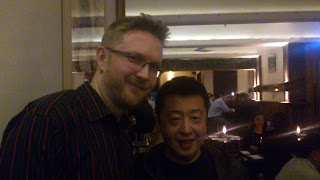As all Melbourne cinephiles will be aware, the annual Melbourne International Film Festival (MIFF) is in full swing as I write. Excitingly for Chinese cinema aficionadoes, leading director Jia Zhangke, along with his wife and lead actress Zhao Tao, are guests of the festival.
Jia made his debut back in 1997 with the extraordinary Xiao Wu (1997), and since then has made a string of classic films about contemporary China, including Platform (2000), Still Life (2006) and 24 City (2008).
Jia will be introducing his new film, A Touch of Sin, in Melbourne tonight (31 July), at the Greater Union multiplex on Russell Street. He'll also taking audience questions after the screening.
A second screening will take place at the same venue this Friday, 2 August.
There are still some tickets available for these sessions. You can book here.
 |
| Dan Edwards with Jia Zhangke in Melbourne last night. Image Dan Edwards. |
You can read an article I did on Jia's career for RealTime back in 2007 here.
You also ead my reviews of Jia's documentaries 24 City and I Wish I Knew.
I've posted my notes on A Touch of Sin from the MIFF website below.
A TOUCH OF SIN
Note by Dan EdwardsA Touch of Sin is absurd. Utterly absurd. Almost as absurd as the real-life events that it’s drawn from. Adolescent prostitutes parade in titillating military uniforms. A middle-aged man shoots rich people to stop feeling bored. Communist cadres sell themselves state assets and buy Learjets with the proceeds. A Touch of Sin is an episodic peak into life in contemporary China from one of the nation’s most acclaimed directors. The view at times is grimly amusing, but it sure isn’t pretty.
Anyone who follows Chinese headlines will be familiar with many of the interconnected tales that make up A Touch of Sin. There are factory workers throwing themselves off dormitory balconies, propositioned receptionists who stab their tormentors, and enraged miners blasting away at corrupt bosses. Director Jia Zhang-ke has always shown an interest in those lost in the slipstream of China’s breakneck speed development, but earlier characters like the pickpocket of his debut, Xiao Wu (1997), were passive types, rendered torpid by the scale of the changes around them. In this sense, A Touch of Sin is a major change of direction. These men and women don’t just stare in incomprehension – they shoot, stab, steal and rob with abandon. Yet Jia’s new protagonists show no more understanding of the world around them than his earlier, more lovable losers like Xiao Wu. It’s as if having made the leap to action, they are determined to see every last urge to its final conclusion, no matter how cruel or inane.
China itself, as framed through Jia’s lens, has also changed. Comparing the images of A Touch of Sin to his earliest works of the mid- to late-1990s, the streets look richer and the people much better dressed. They move across the country’s vast expanses on shiny new highways or in sleek bullet trains, following the flows of transnational money and all the pleasures and corruptions it has to offer. For a few seconds, Jia even inserts himself into this transformed world, morphed from the small town cinephile glimpsed riffling through a box of pirate DVDs in his third film, Unknown Pleasures (MIFF 02), into a licentious, cigar toting art collector, salivating at the site of scantily clad girls in a luxury sauna. Everything looks so much newer than it did 20 years ago, yet the sheen is all surface deep, masking a culture that gets darker with each passing film. At the heart of it all is a society that has developed so fast, and gone through so many wrenching upheavals, that nothing now seems beyond the realms of surreal possibility.
A Touch of Sin is almost too replete with startling images, explosions of violence, and moments of quiet menace to take in with just one viewing. Like the experience of China itself, the film simultaneously conveys contradictory feelings of sensory overload, frantic activity, and the overwhelming sense of inertia that comes when events seem so out of control. Jia’s film offers no answers, but instead leaves us reeling – and, in the final few moments, gazing back into the lens to ask why.

No comments:
Post a Comment